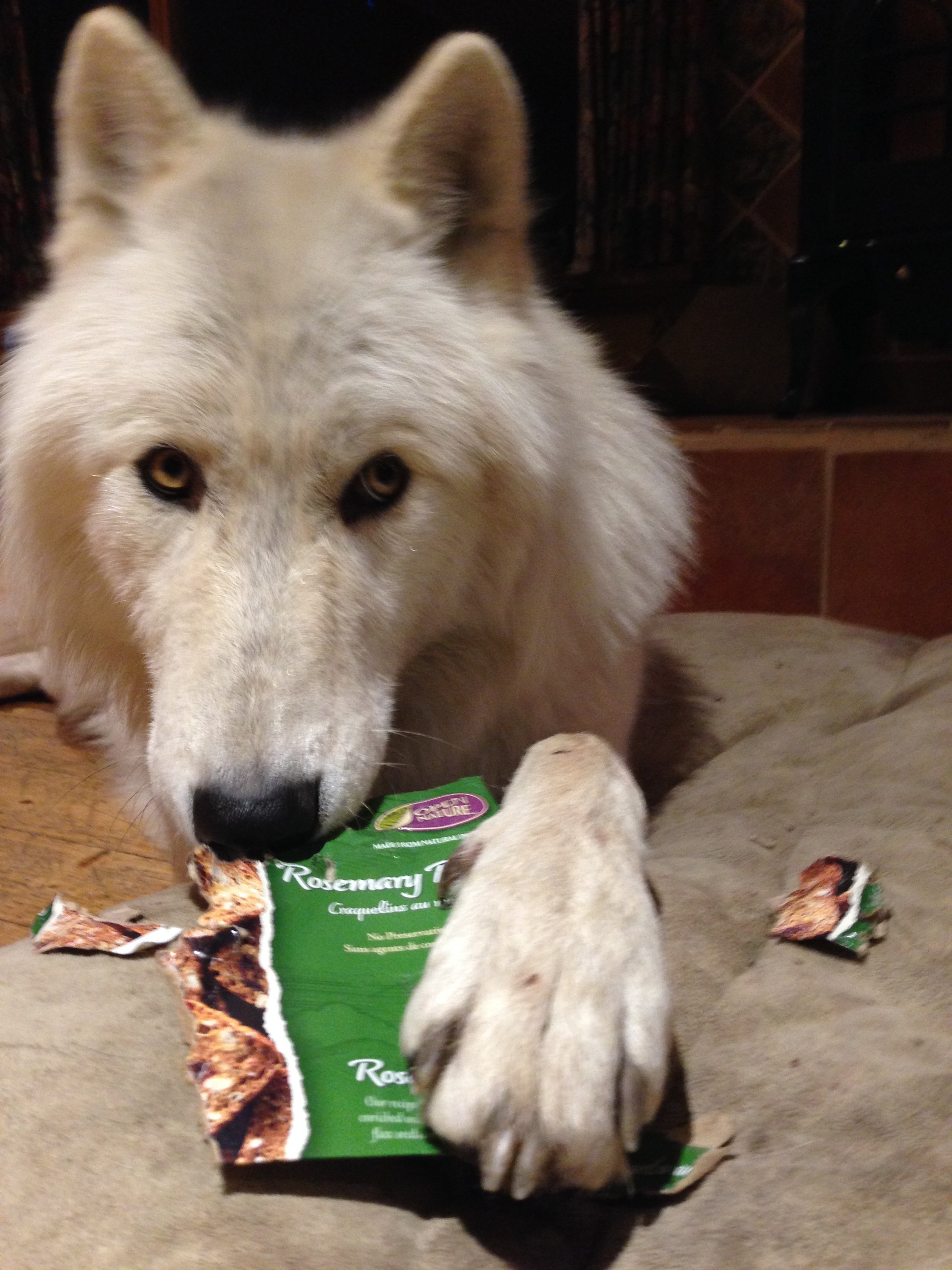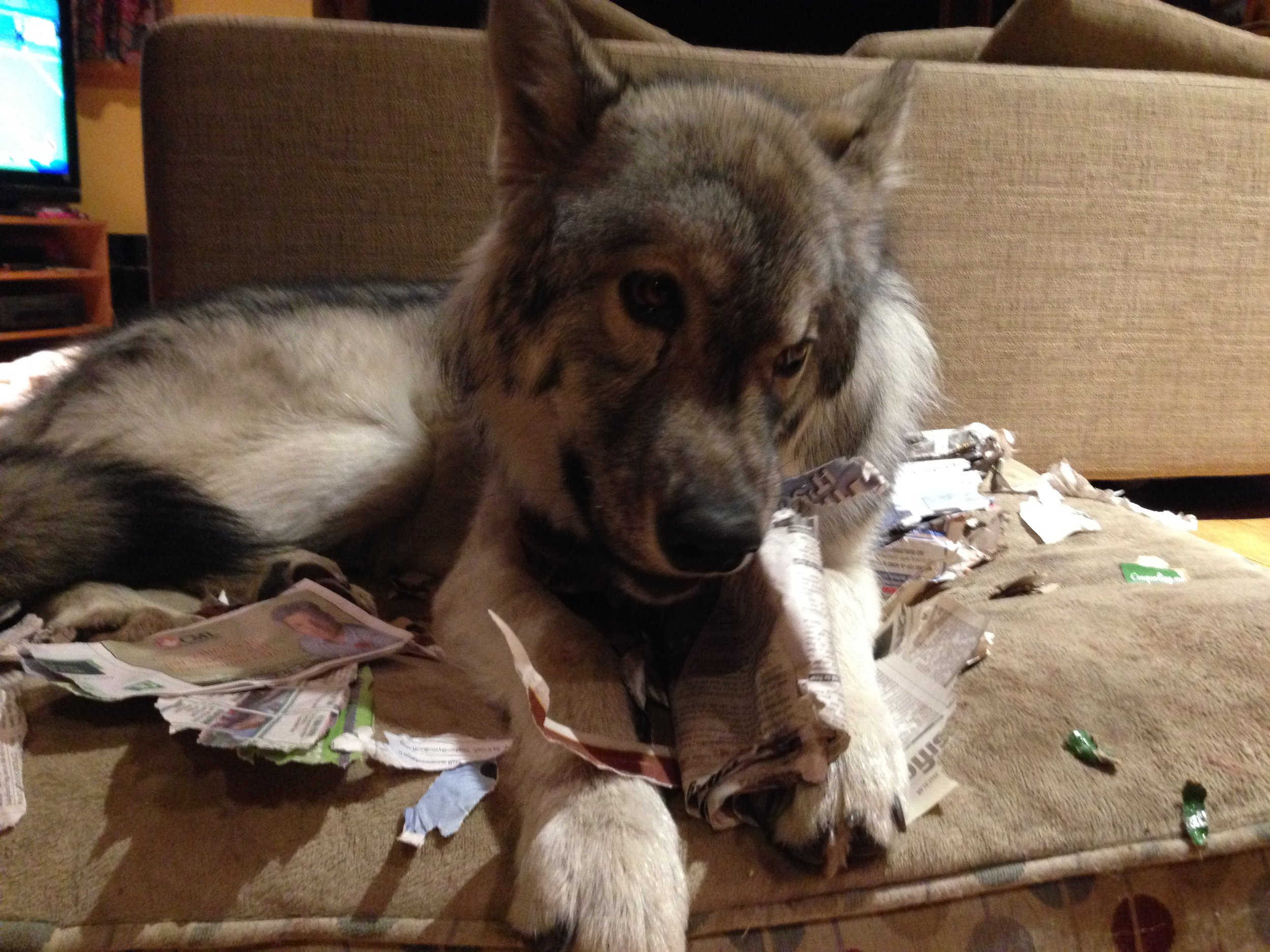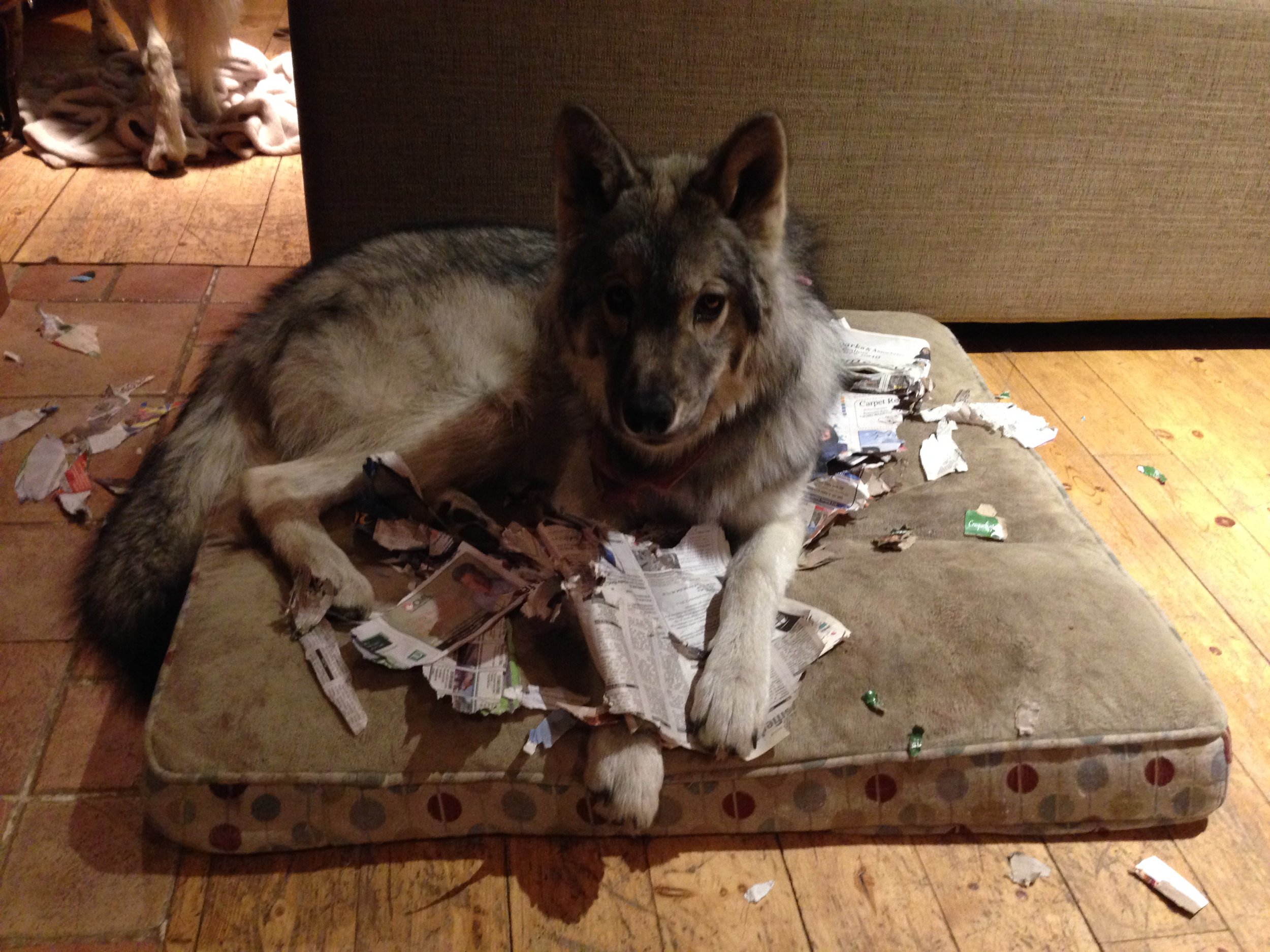Resource Guarding
Resource Guarding is a behaviour you should expect when owning a wolfdog. You might be one of the lucky ones and have a wolfdog that isn’t picky over resources, but if you own or are planning on owning a wolfdog with any significant amount of wolf content, expect to have to manage this behaviour. Note, I say MANAGE this behaviour. This is not something you are ever likely to ‘train’ out of your wolfdog. It becomes about building trust and boundaries with your wolfdog in order to live with this very interesting instinctual behaviour.
In case you don’t already know what resource guarding is, let me give you a quick run-down. Wolves equate valuable resources to survival. It is an engrained behaviour that helps them to survive in the wild. Essentially, they will protect, guard, hoard, or be possessive of the things they deem critical to survive. The most important physical resource of course, is food. That’s why when you see those iconic video clips or photos of wild wolf packs eating on a carcass, there are usually a lot of teeth, snarls and commotion involved.
Food is usually a highly valuable resource that the wolfdogs are unwilling to share.
In our more domestic wolfdog counterparts, this possessiveness of items is extended to not only food, but also pretty much anything else they find of interest. Now, if you are saying, “Well Georgina, the dish towel my wolfdog grabs and guards from me has nothing to do with his survival”, I hear you. Technically wolfdogs do not need to guard and be possessive of items in order to survive… but we have to remember this is an instinctual behaviour. It is a remaining hard-wired circuit in their brains from their wild ancestors. So pretty much anything your wolfdog may find particularly interesting or valuable they may choose to guard from you. This value system can occasionally also apply to being possessive over people or their own packmates.
If a wolfdog gets hold of an item and become possessive over it, don’t expect to be able to walk up to your wolfdog, open its mouth and take it away. You will likely be greeted with many growls, snarls, and maybe even some air snaps. This is not aggressive behaviour. This is communication and it is normal! However you do need to respect it as they can mean serious business.
Kuna was not feeling very festive this day. She got a hold of this decoration and quickly dispatched Mr. Frost from his duties…
So why is resource guarding a problem? Well, there are many different scenarios where this can become challenging and I will only cover a few. Probably one of the biggest ones that I deal with here at the Sanctuary is when the wolfdogs grab a hold of something they are not supposed to. If they grab it, it could be difficult or even impossible to get it back, and that could become a health and safety concern for the wolfdog. For example, if we drop something out of our pockets like a glove or even worse one of our radios, the wolfdogs will scoop that up in an instant and run off with it. Not only do we ideally not want this item destroyed, but it is potentially a risk if they ingest something they really shouldn’t. Wolfdogs are extremely curious creatures and they use their teeth as their primary way to discover and explore things. A glove will get ripped apart, and a radio will become a chew toy. This is not ideal. One thing I should add is that this doesn’t just apply to things you drop. If they can steal it from you, that counts too! We have learnt these lessons time and time again. As a result, we are super mindful of ensuring that all our belongings and supplies are securely attached to us, our pockets are zipped, and we are not entering enclosures with any items we are not able to have good control over. Because if they grab it, it’s as good as gone.
For wolfdog owners specifically, another issue with resource guarding is kids. As adults, we have the ability to really understand how to deal with and manage this resource guarding behaviour. We can most certainly not expect kids to, and this could become a major safety concern for kids. Think of it this way….if your toddler is playing with or holding its toy and your wolfdog decides whatever thing your child is holding is valuable, your wolfdog may run up and steal it from your child. Not a great thing to happen, but fine. The bigger issue lies in what potentially happens next. Your toddler may very likely want to run up to the wolfdog to grab his or her toy back! If the wolfdog then reacts with snarling or snapping, this is a recipe for disaster. This is one of the biggest reasons why wolfdogs who display any degree of resource guarding should never be left with children unsupervised. Ever. It isn’t fair for the wolfdog and it certainly isn’t fair for the child.
These are just two examples of why resource guarding can be a challenging behaviour to deal with. I can assure you there are many more! Hopefully from these two you get the point.
Zeus had zero plans on allowing Seiko anywhere near his bone. This is a prime example of using snarls, growls and snaps as a means of communication.
Another thing to keep in mind is that wolfdogs are incredibly intellectual so they make associations to things very quickly. Just as an example, we carry the wolfdogs’ food around in buckets. If they have access to one of these buckets (even if it’s completely clean and empty), they will grab it and guard it. Because for them, that bucket has an association to a high value item. Same thing goes for small plastic bags as those are associated with treats, and also cardboard as their raw food we order comes in cardboard boxes. It isn’t just the actual food they will become possessive over, but also anything they associate with the food.
So now we know what some of the issues can be with this behaviour and why they display this behaviour…but what do we do about it? Or in other words, how can we manage it? The first thing is to truly understand the behaviour and know what your wolfdog’s trigger items are. What types of things does your wolfdog display interest in and what are they indifferent to? This takes time and experience. Just as an example, Kuna guards food of course, but not all kinds. A chunk of deer meat is high value to her, whereas if I give her a hard boiled egg, she doesn’t seem to care. Nova will guard any food from me. If I drop a glove, my phone, leave a bucket laying around, Kuna doesn’t care. With Nova, any of those items he would snatch up in a heartbeat and run off with them in order for him to decide if they are worth anything to him or not. Each animal has their own value system and it is up to you to take the time to discover what that is. For a list of strategies to help minimize resource guarding in your wolfdog, read our Managing Resource Guarding: A Guide to Peaceful Coexistence article.
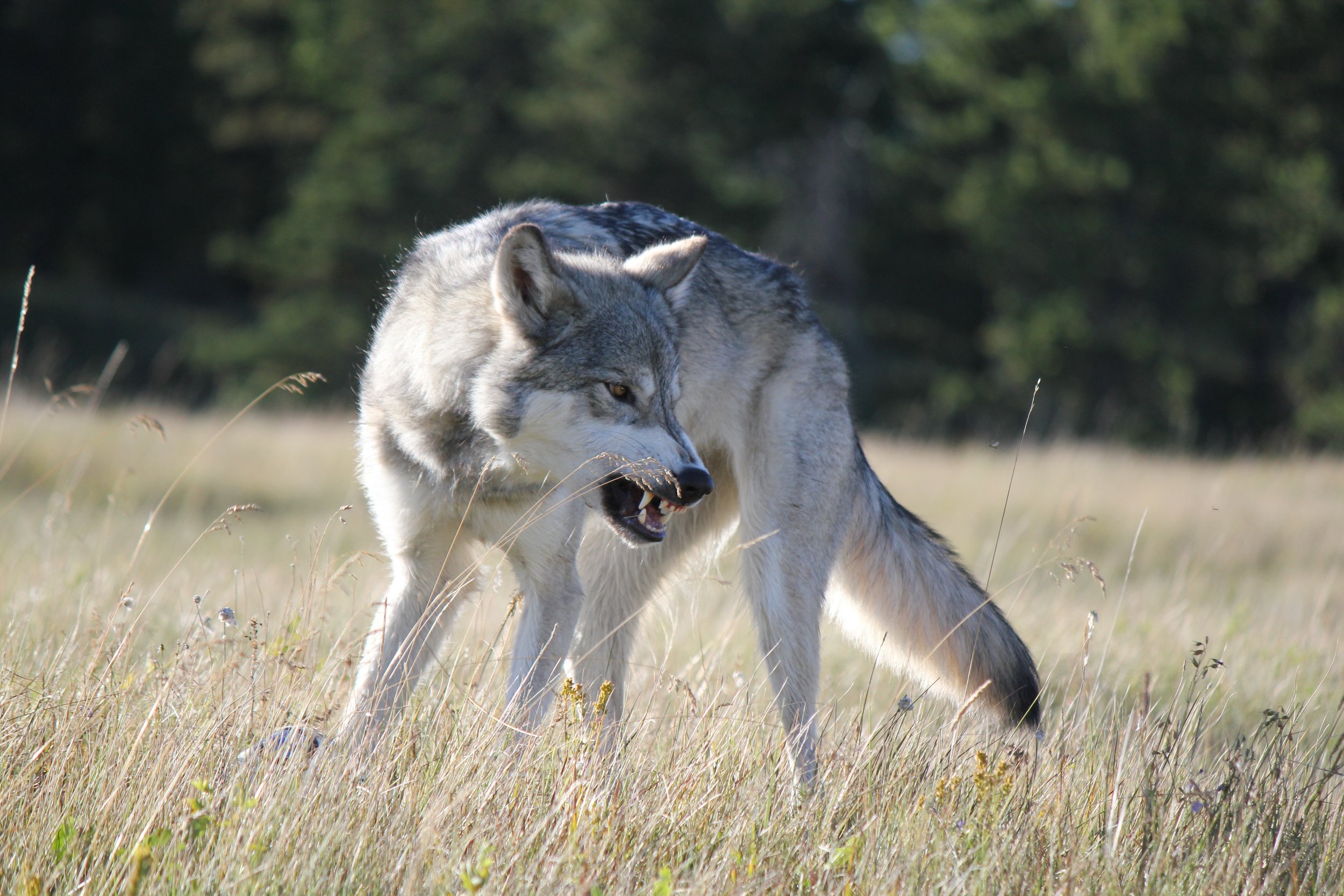
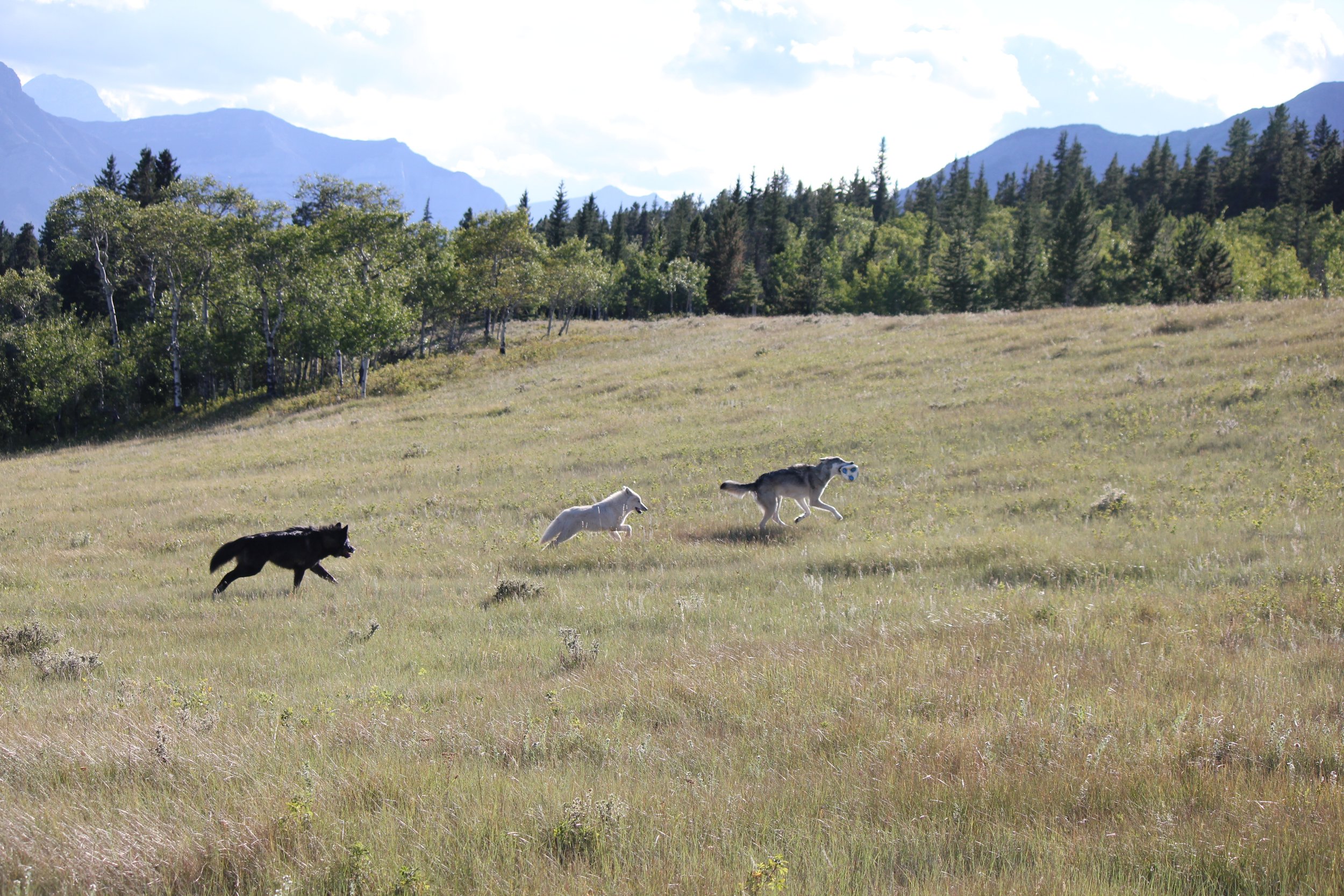
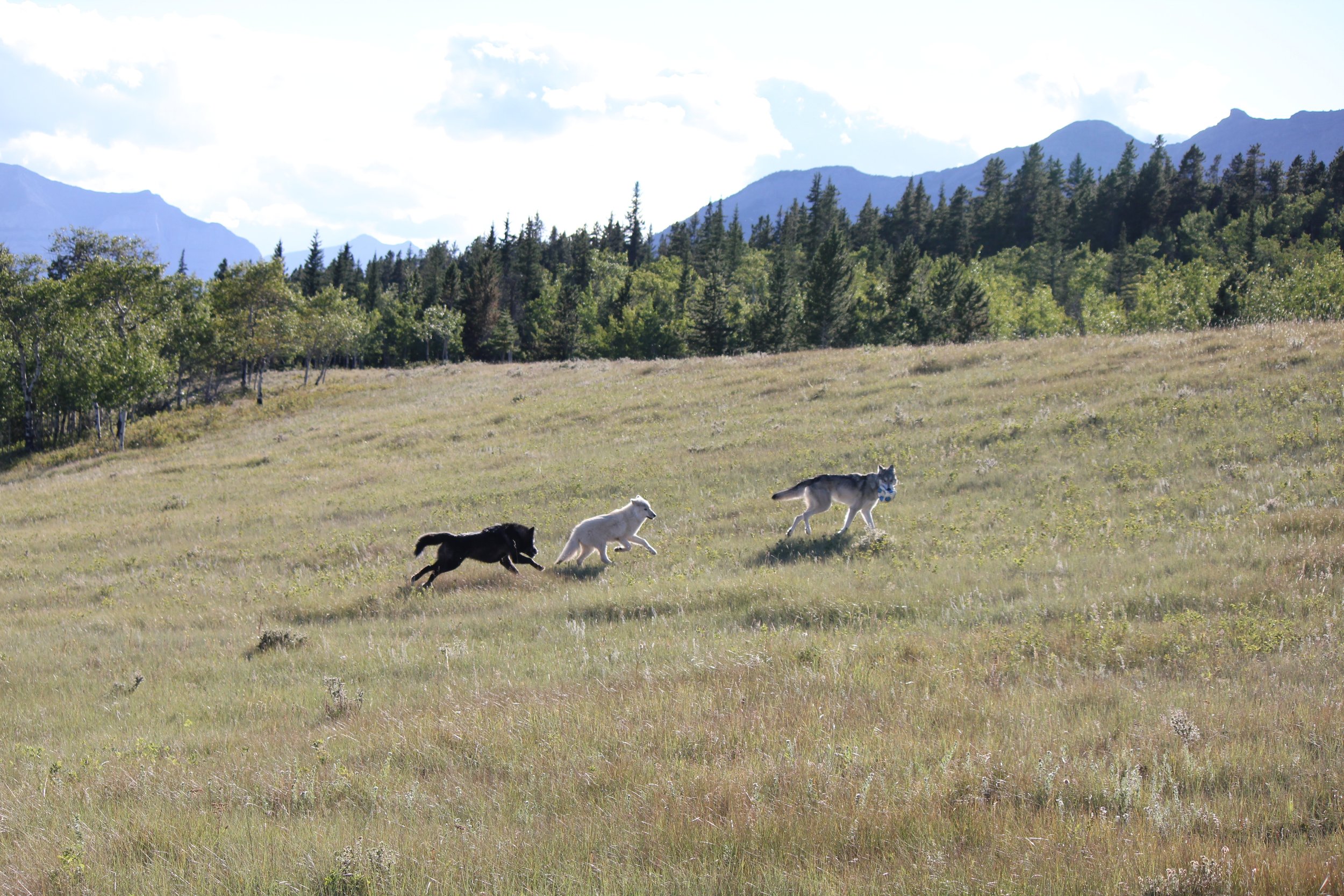
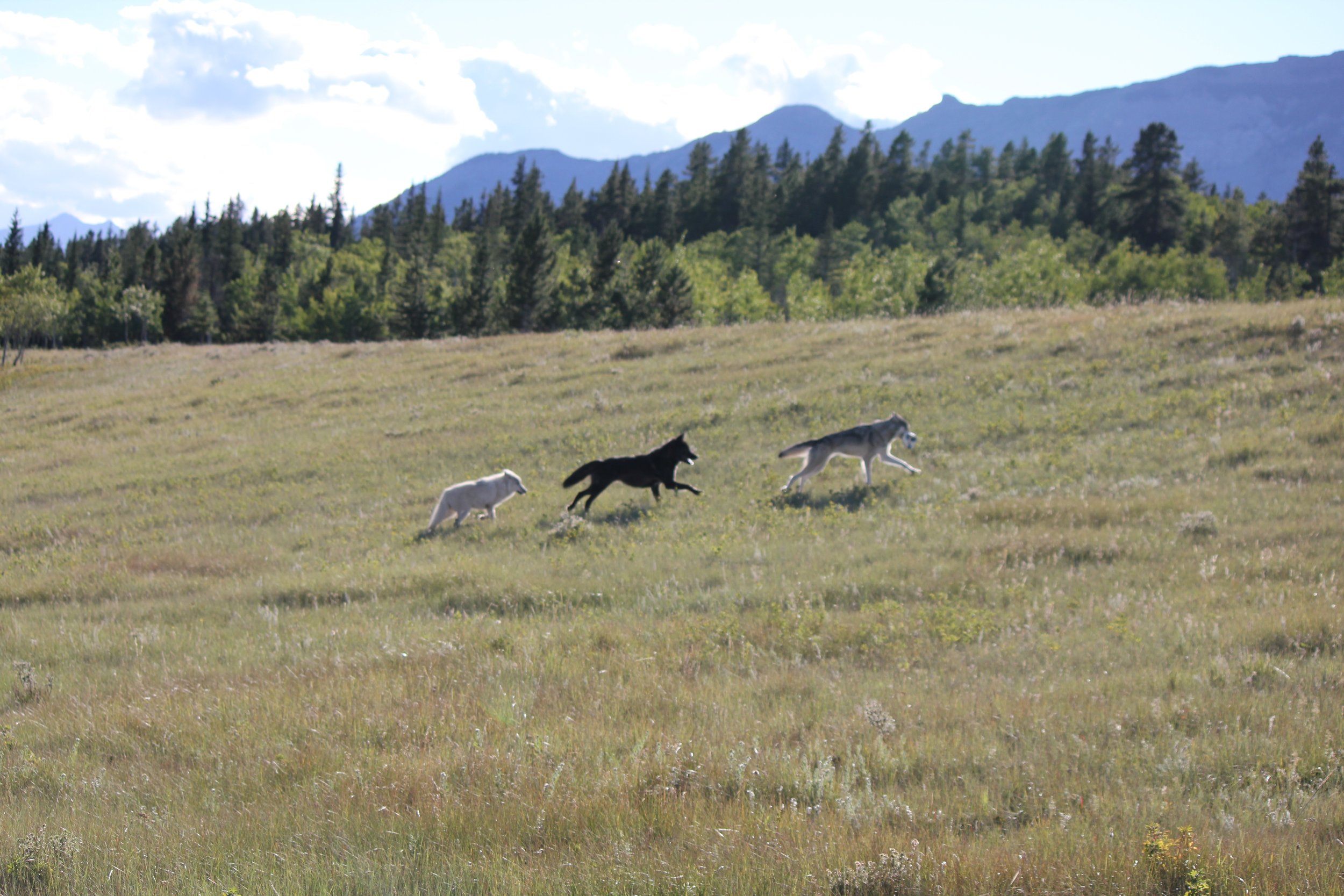
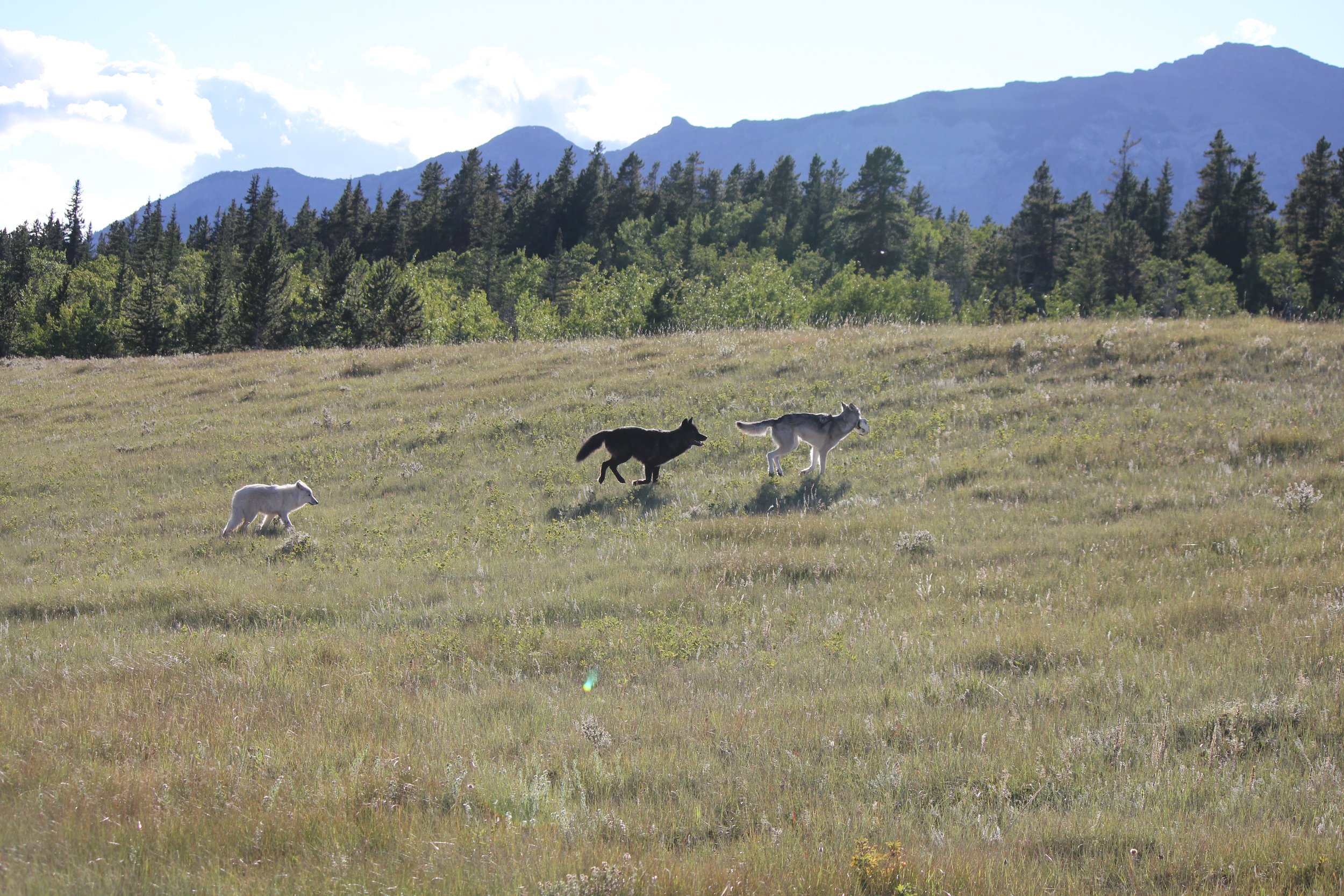
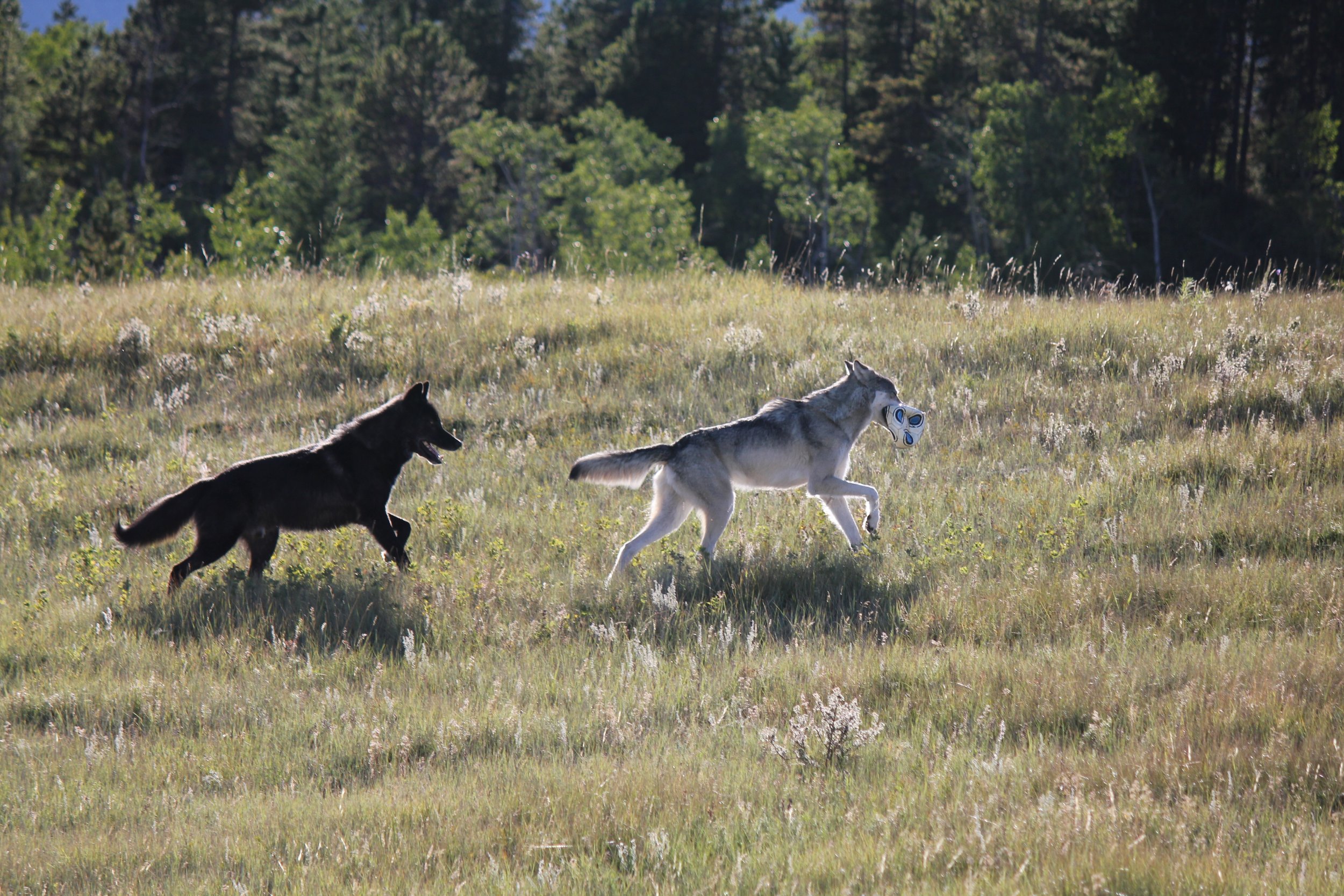
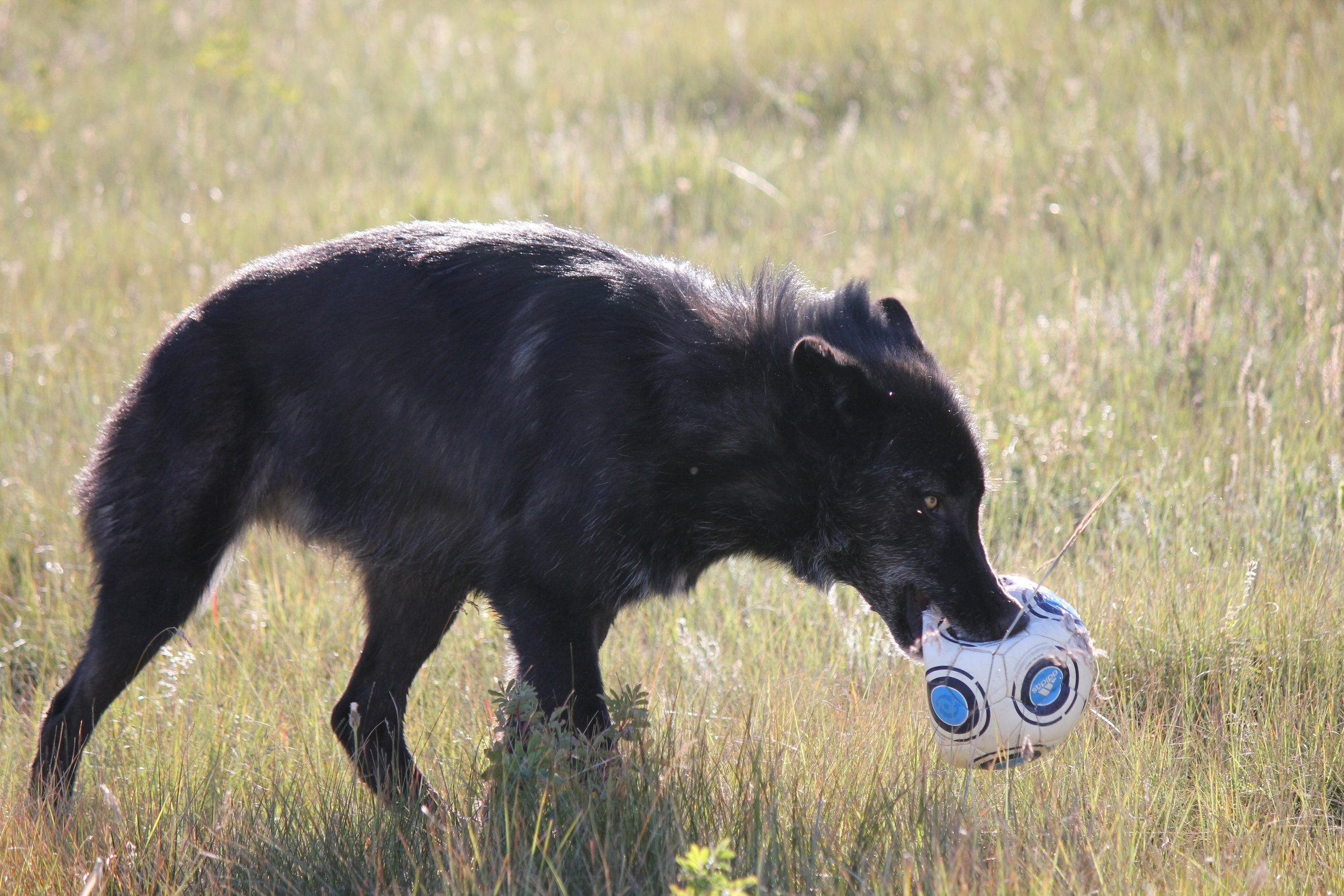
Here is a fun photo series of Kuna, Zeus and Nova competing with one another for the soccer ball they found floating in the river. Opportunities like this taught me so much about behaviours such as resource guarding!
As a fun little side note, the more you care about an item the more they will too! If a wolfdog grabs something from me and right away I show that ‘oh my god, I don’t want you to have that!’, it just ups the value of that item making it even harder for me to retrieve. If I pretend like I don’t care, then they may just lose interest too. Let me give you an example. If a glove falls out of my pocket and Nova grabs it, my first thought is ‘well even if he shreds it, it’s not the end of the world’. My best strategy for getting my glove back is to devalue it. If I ignore what just happened and go about my normal business, he might just realize it’s only a glove, not food, and drop it and walk away. If I have a treat on hand or something else he may find more valuable, I can distract him with that by throwing it a few feet away, allow him to go run after that, and then I can go retrieve my glove that he has now abandoned. If Zeus is around, I have to be quick or Zeus might just scoop it up and then I have the same problem! Wolfdogs are very observant. If they notice you value an item, you are signaling to them that they should too!
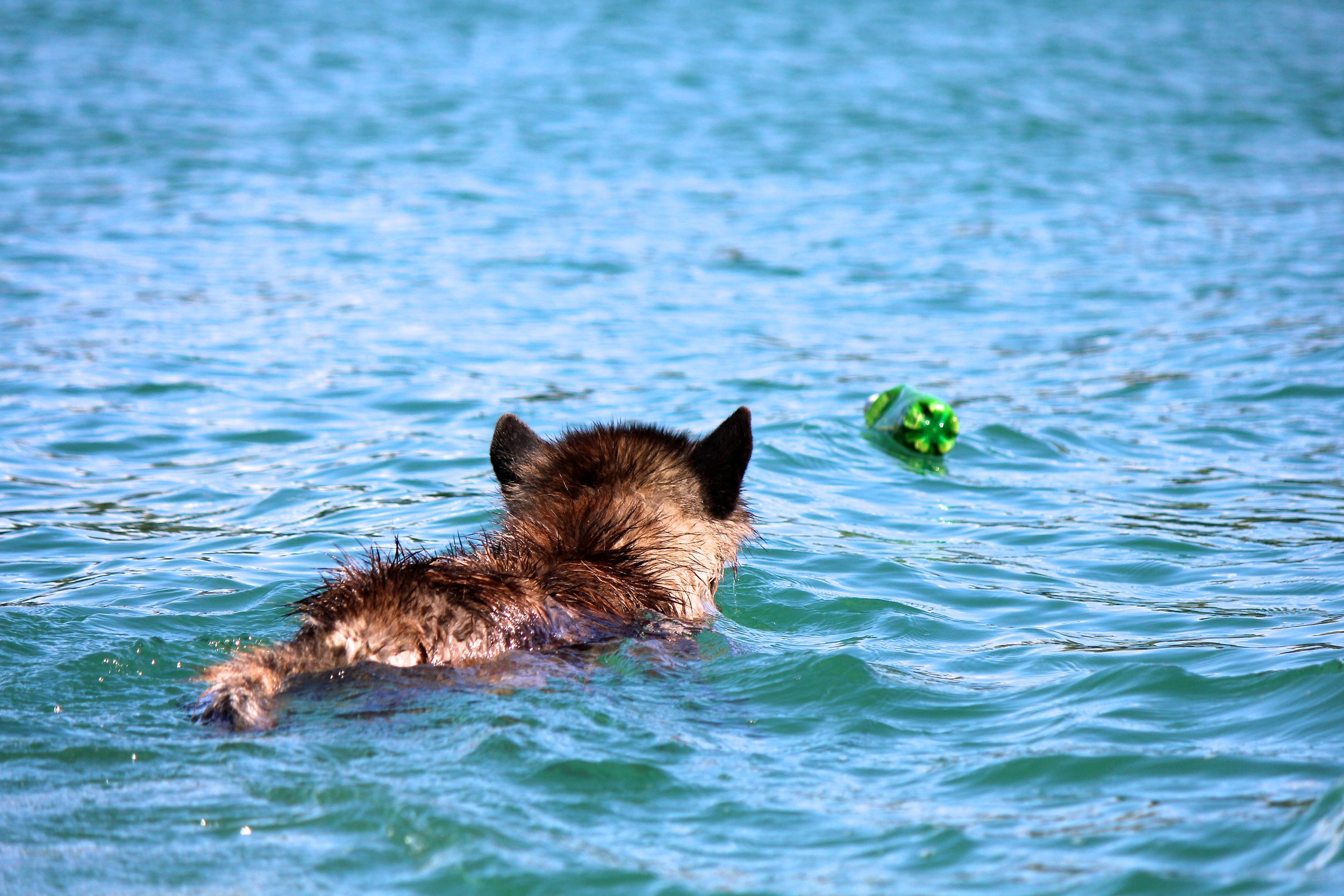
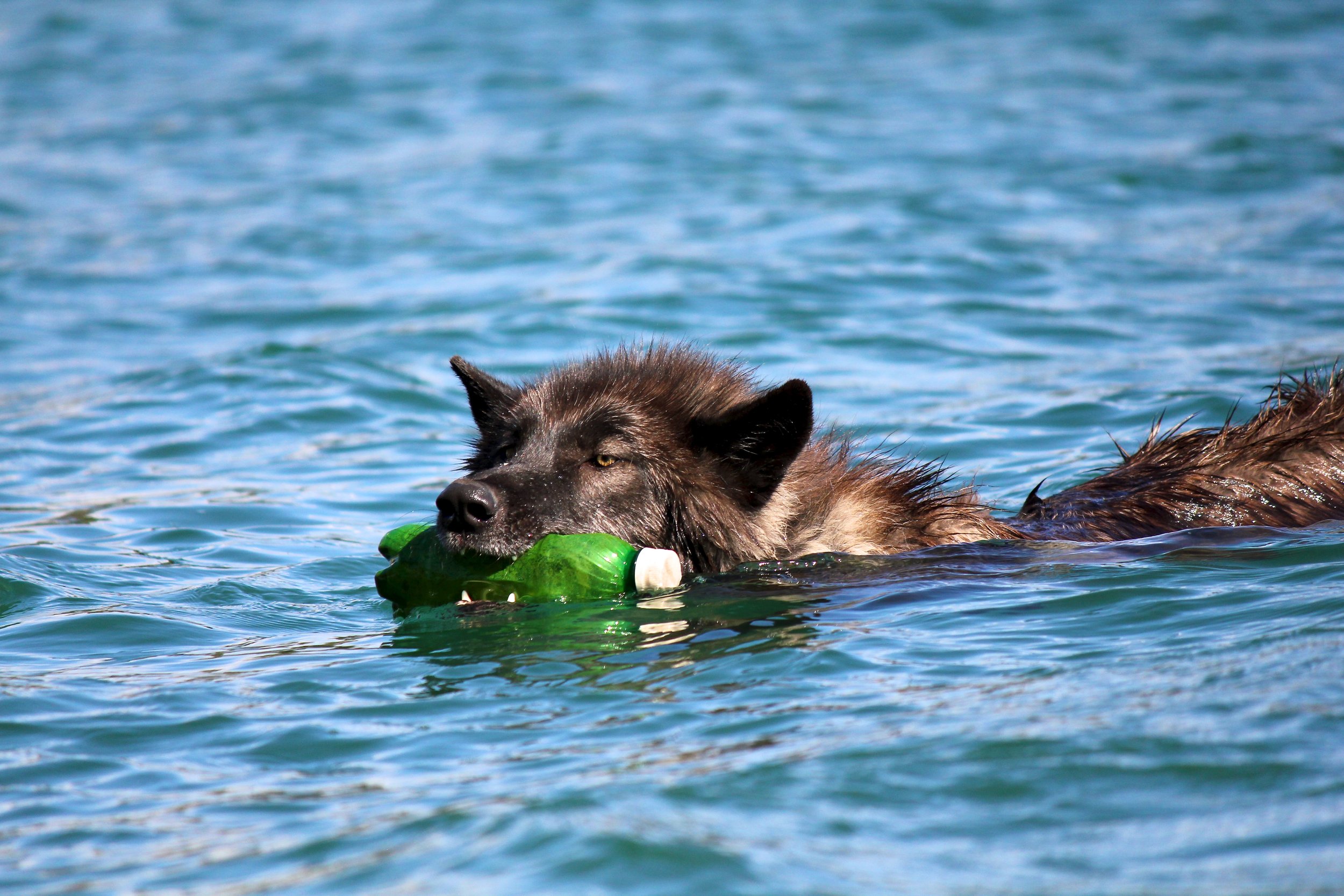
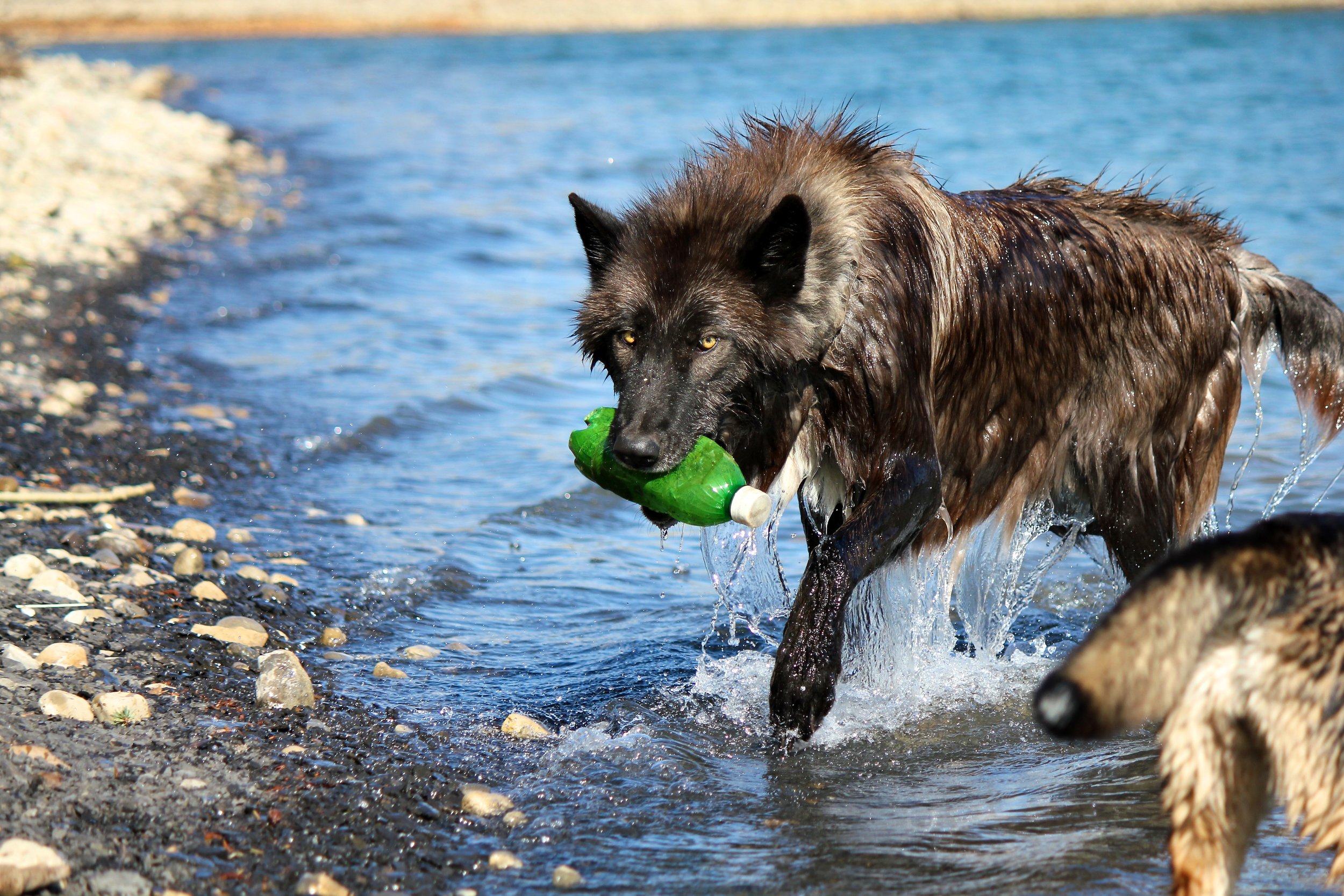
Zeus had a habit of finding all sorts of things on our walks to try and show off. As long as no one took interest in the object he had, he would drop it and move on pretty quickly.
As far as setting ourselves and our wolfdogs up for success, here are some things you can work on:
-
This takes time, but through some of the strategies I will lay out below, you can increase their tolerance level of you being around their resources. They can learn that when they have something of value, you won’t take it away and therefore will tolerate you being in their vicinity without the snarls, snaps, and angry faces.
-
Life with wolfdogs is all about setting boundaries. They have boundaries they won’t allow you to cross, and you should have boundaries that they know they can’t cross. Sometimes we have to be assertive and let them know it isn’t okay to put their muzzles in our pockets and steal our stuff!
-
Remember that resource guarding is normal! This doesn’t make your wolfdog aggressive or make you a bad owner. Be aware of what triggers your wolfdog and respect that. Give them space and allow them to be who they are. That will get you much further than trying to train this behaviour out of them.
-
You never know when you WILL need to retrieve something your wolfdog is being possessive over. Learn what things your wolfdog deems as HIGHLY valuable and practice swapping items out with them. This builds a lot of compound trust over time.
Nova used to resource guard dog toys all the time. One day I tried to give him every single dog toy I could find to try and remove the scarcity mindset that comes with resource guarding. This strategy did not work!
Here are some training ideas for managing resource guarding:
If you have a puppy that has not fully developed these resource guarding behaviours yet, there are some very important steps to take. I won’t go in great detail here, so if you have specific questions, send me an email or message. For the sake of keeping this article somewhat concise, here is a short and sweet run down:
1. Hand feed your puppy: this not only teaches your puppy that food comes from you, but it teaches your puppy to tolerate you in its space whenever food is around. This will also help to create a positive association to you, a human through food, but it also normalizes the fact that you the human can be around them when they have these valuable items. The lesson is that you provide the high value item; you are not there to take it away.
2. Practice lots of trading: if your puppy has something of value, trade it out for something even better! The lesson here is that your puppy learns that if it gives something up to you that it values, he or she will be rewarded with something even better. Again, it creates positive associations and trust, and starts to train appropriate decision-making for in the future.
3. Prevention: if you know your puppy has specific trigger items, don’t leave those items laying around for them to have easy access to and practice their possessive behaviour.
Giving the wolfdogs their space when they are eating goes a long way in keeping the peace and building up trust. Over time they will learn you are not interested in their food and they will become more and more tolerant of you being in their space.
If you have an adult wolfdog where that socialization window has closed, there are still things you can do to teach new thought patterns and manage this behaviour. Perhaps handfeeding is not feasible, but you can still do your best to prevent resource guarding by controlling what items you allow them to have access to. You can most certainly practice trading to create positive associations and good practices. This trading game is something I use ALL the time.
In my opinion, it’s important to pick the battles actually worth fighting and ignore the ones that aren’t. Over the years I’ve become a lot more tolerant of the wolfdogs destroying my stuff. It’s honestly just a fact of life at this point. If I’ve been silly enough to give them access to something that I didn’t want them to have, well that’s just the price I have to pay. The only time I truly choose to get something back from a wolfdog that they are full on resource guarding is if it puts their health and safety at risk. My go to strategy for this is grabbing something of much higher value and trading it out. For the wolfdogs I have spent years with, we have a fairly good understanding and this is pretty simple. We have practiced it so many times that they pretty much know that I will grab something they want even more so they will readily give up whatever they are holding on to. For wolfdogs I don’t have that experience or relationship with, I have to be extremely careful in how I approach this.
Often times on our wilderness walks, the wolfdogs would find all sorts of items to guard from one another. These ‘wild’ finds were always extremely valuable.
A wolfdog that is INTENSELY resource guarding and has decided that having this item is life or death, we have to be really careful and really smart. With at least 2 people we will grab lots of high value items as well as some kind of physical barrier to keep ourselves safe if necessary. This is where we can use their fearfulness of new and strange things to our advantage. Strategy number 1 is to try to trade out with something better and hope they let go of what they have (rather than bringing it along), and strategy number 2 is use a physical item or noise that they are scared of and may want to avoid and therefore move away from the item they are guarding. Many times, their fear response will override their resource guarding response. Just to make it very clear, using an object or noise that is scary to them should never be used to antagonize or threaten them. It’s literally just used as an emergency strategy in order to redirect their attention away from being possessive over an object that is absolutely critical for their safety for you to get back. Using this strategy can put a bit of a dent in your ‘trust jar’ with your wolfdog so you must decide if this is appropriate or not.
Frankly, we usually just let the wolfdogs destroy whatever they have gotten a hold of and clean up the pieces later. Unless we know we are dealing with a wolfdog that ingests silly things they destroy, we don’t bother going through the battle of trying to steal it back. Our wolfdogs aren’t living indoors with us so there is little opportunity for them to grab things they aren’t supposed to. As a result, it’s not something we have to deal with often. It’s mainly just a behaviour we see when it’s feeding time so we ensure to give the animals their space accordingly.
Over the last 10 years I will say we have lost a few bags, gloves, buckets, watering cans, wallets, treat bags, etc. to the wolfdogs, but because we don’t make it a big deal, they usually put a few teeth marks or rips into the items and then get bored and move on with their day. Most of the time, it’s really not worth picking that battle. The way I choose to look at it, it’s just another ‘cost of doing business’ and sharing our lives with these intriguing creatures!
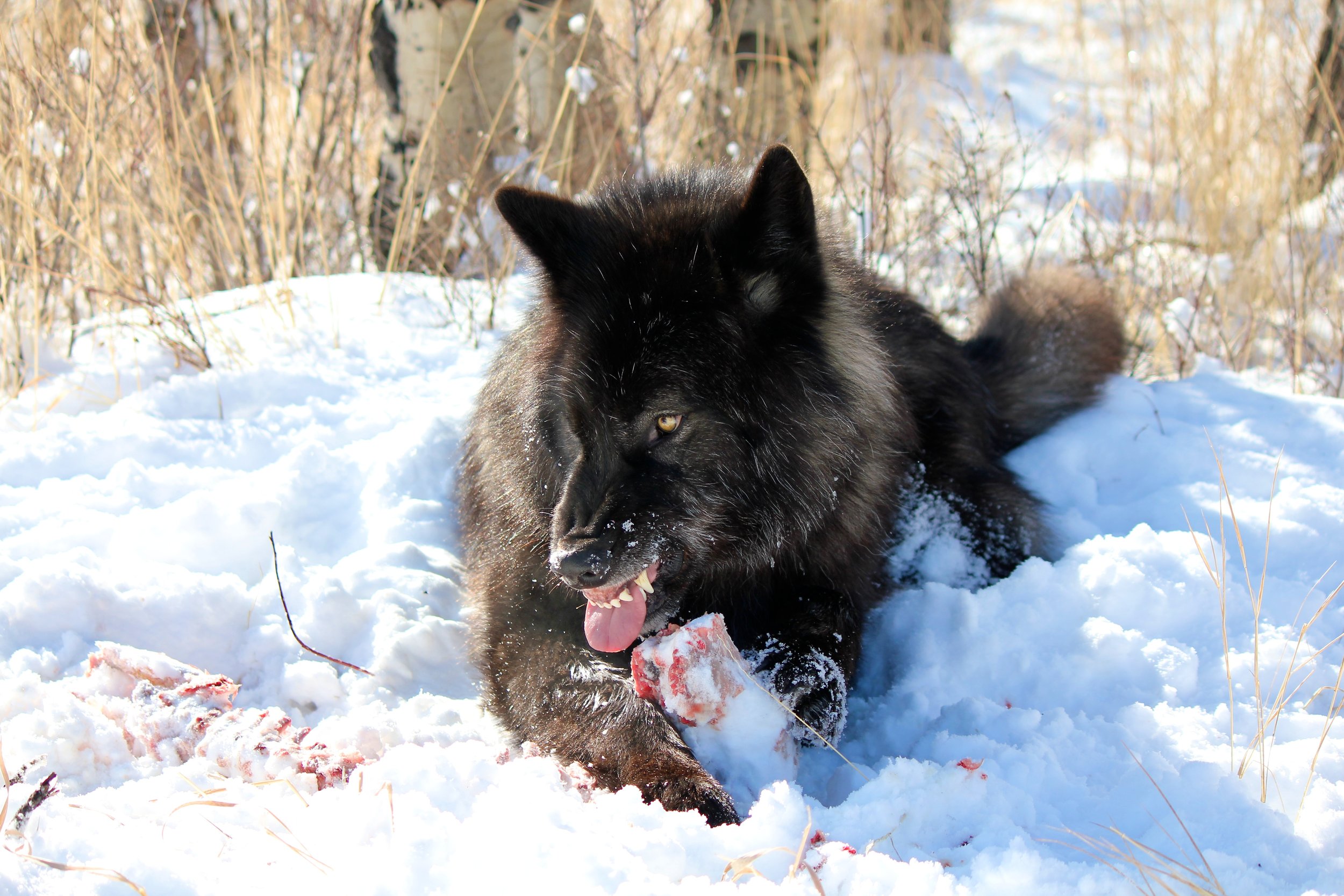
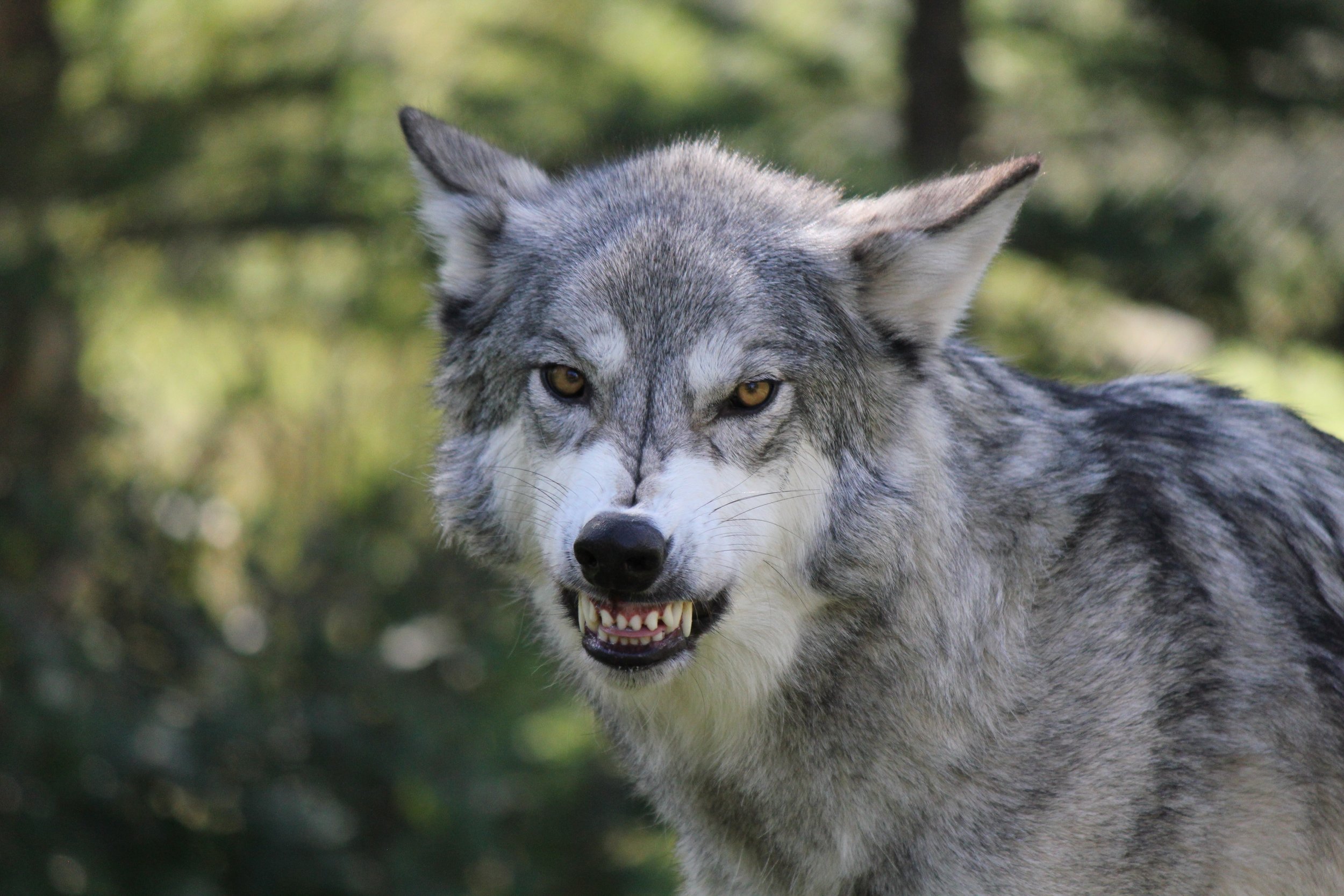
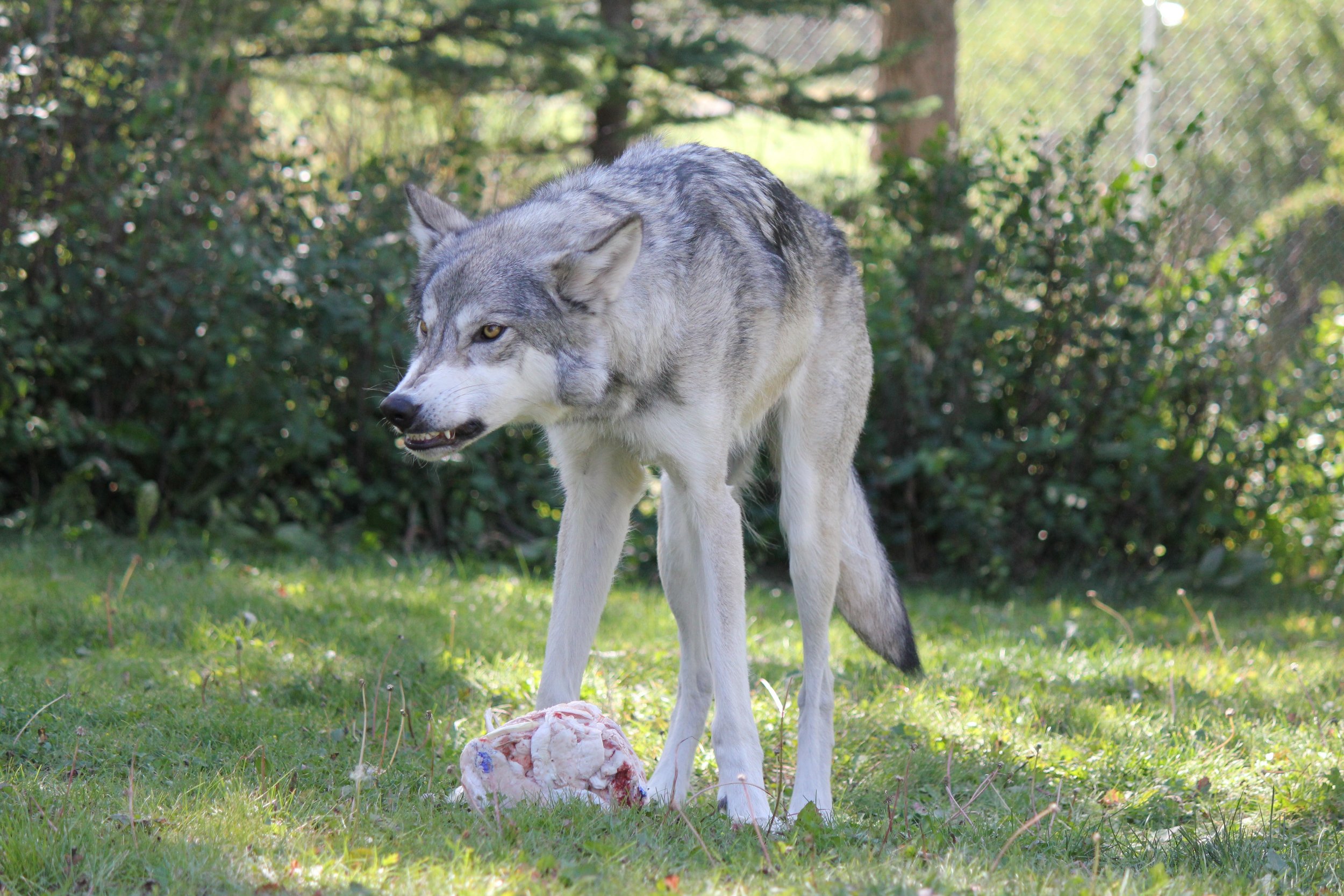
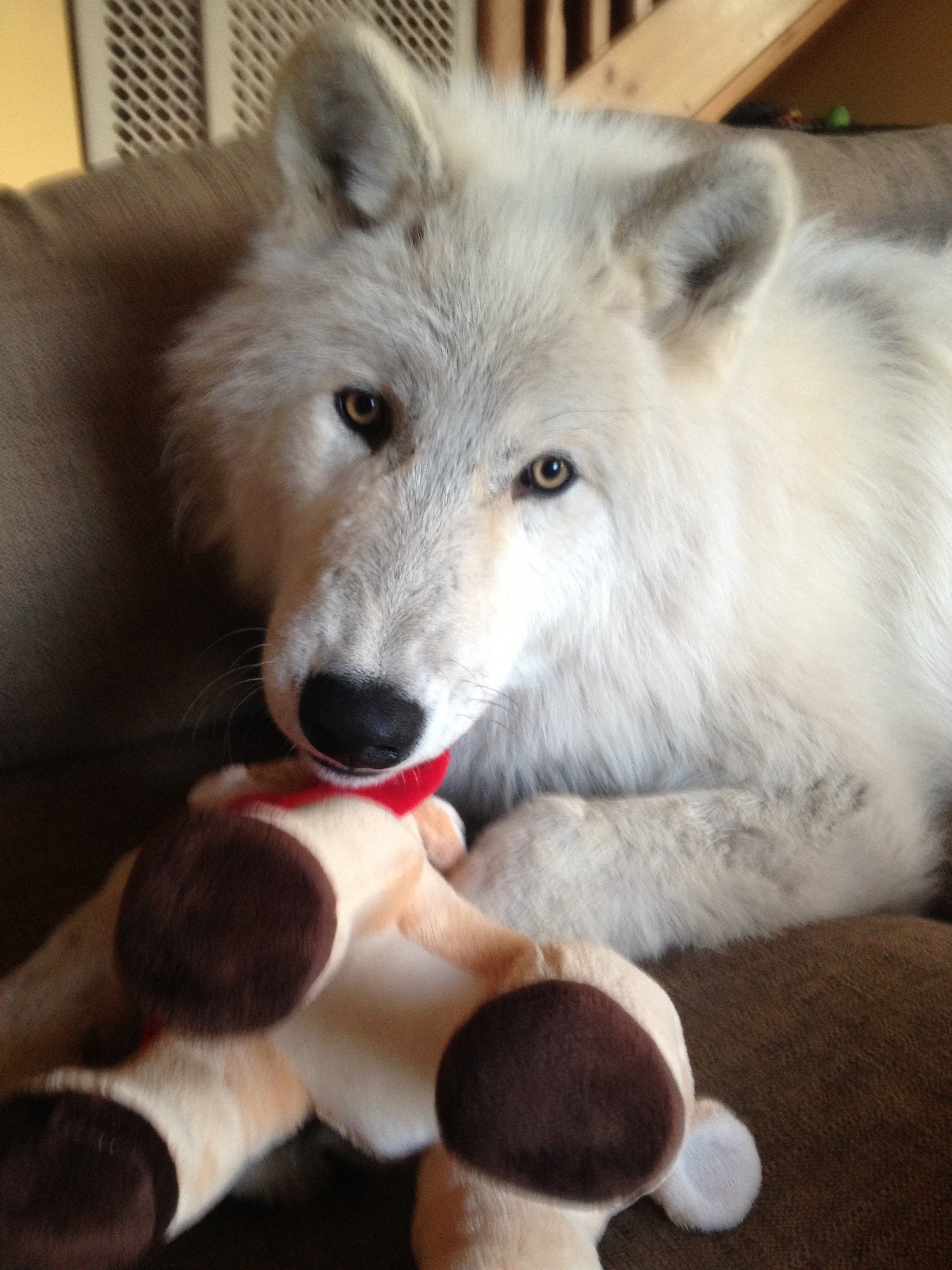
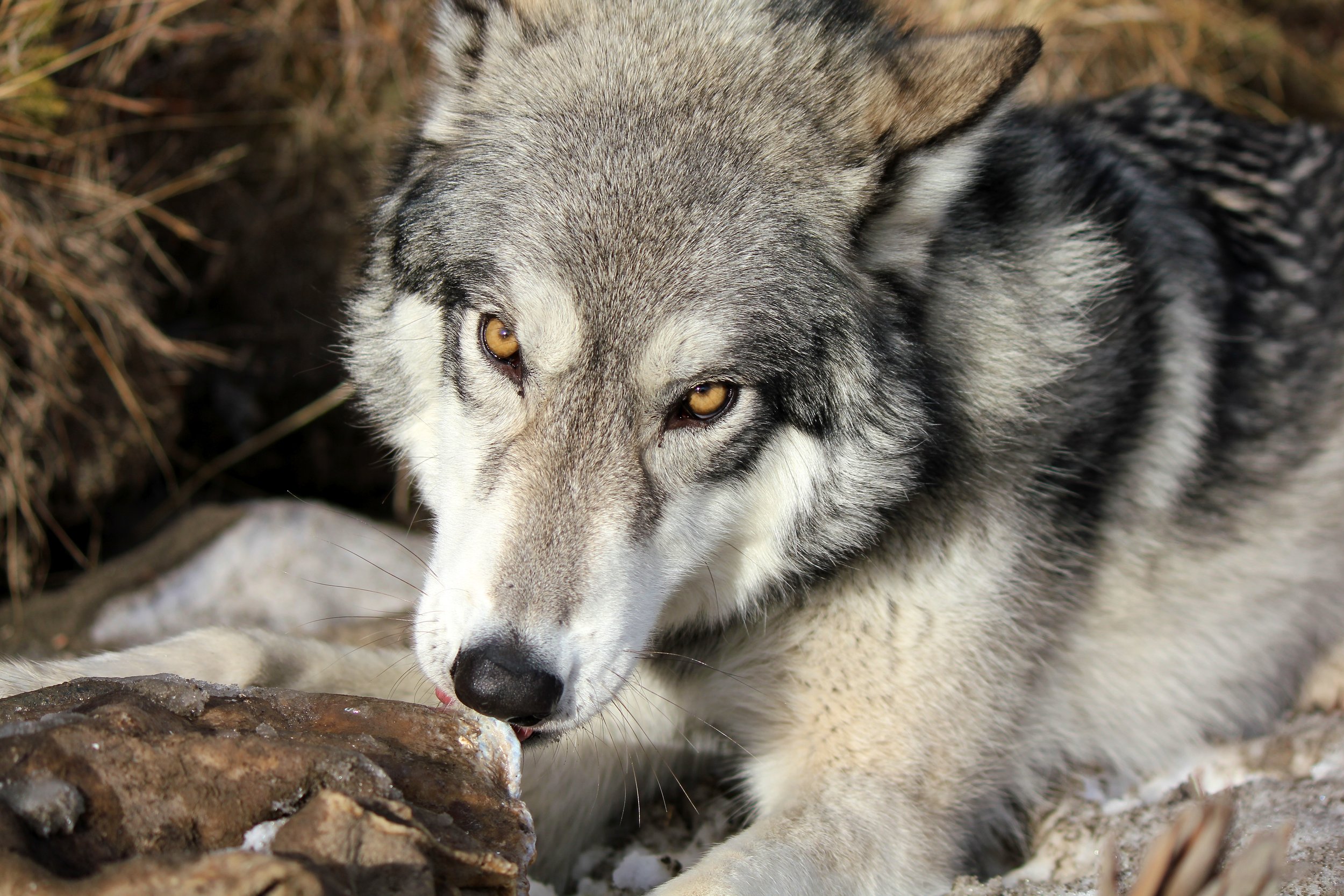

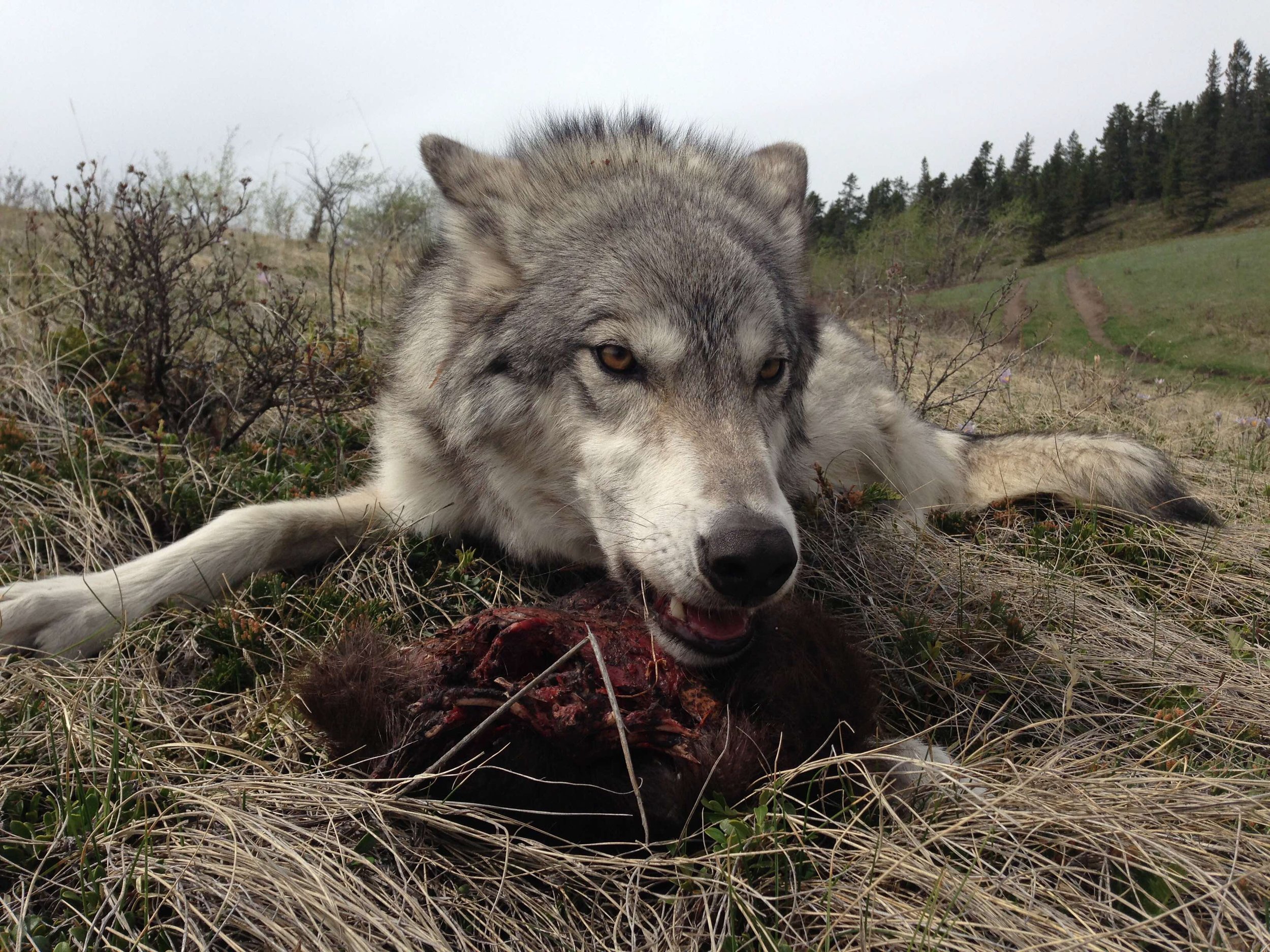
Summary:
Resource guarding is an instinctual behaviour pure wolves developed in order to survive in the wild
In wolfdogs, this can translate into extreme possessiveness over every day items. This could mean growling, snarling and snapping at you or other animals around them
Resource guarding is normal. Your wolfdog is not aggressive and you are not a bad owner if your wolfdog displays this behaviour
Their affinity to grab or steal items can pose a health risk if they destroy and ingest these items
Wolfdogs that are resource guarders should never be allowed to have unsupervised access to children
It’s imperative that you get to know your wolfdog’s value system and what types of items they tend to guard
Use trust, boundaries, and awareness to mitigate the negative effects of this behaviour. Know your strategies to deal with this behaviour when it arises
Use prevention and trading as your best strategies to manage your wolfdog’s resource guarding tendencies
Decide which battles are worth fighting. If appropriate, sometimes it’s easier to just walk away and clean up the pieces later on








